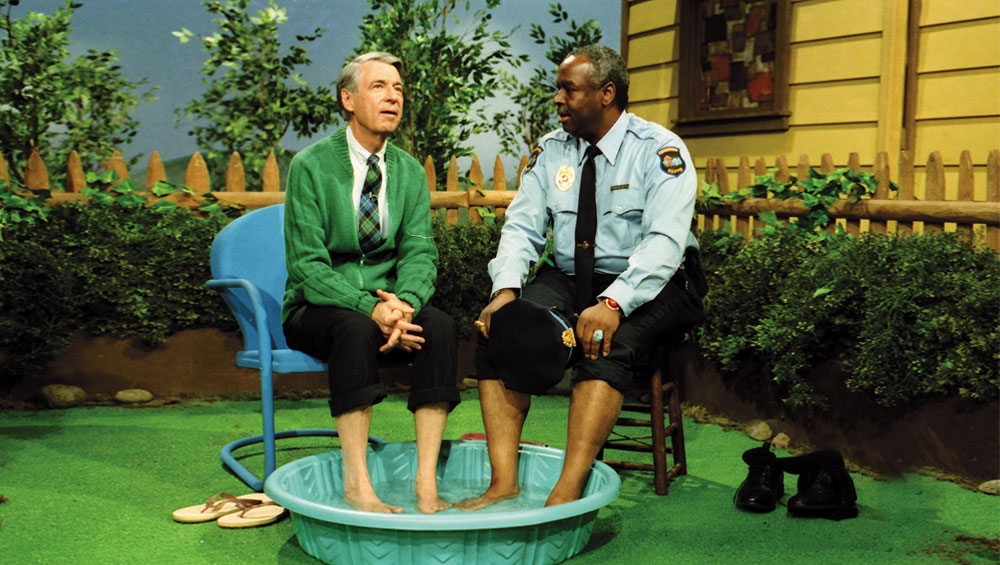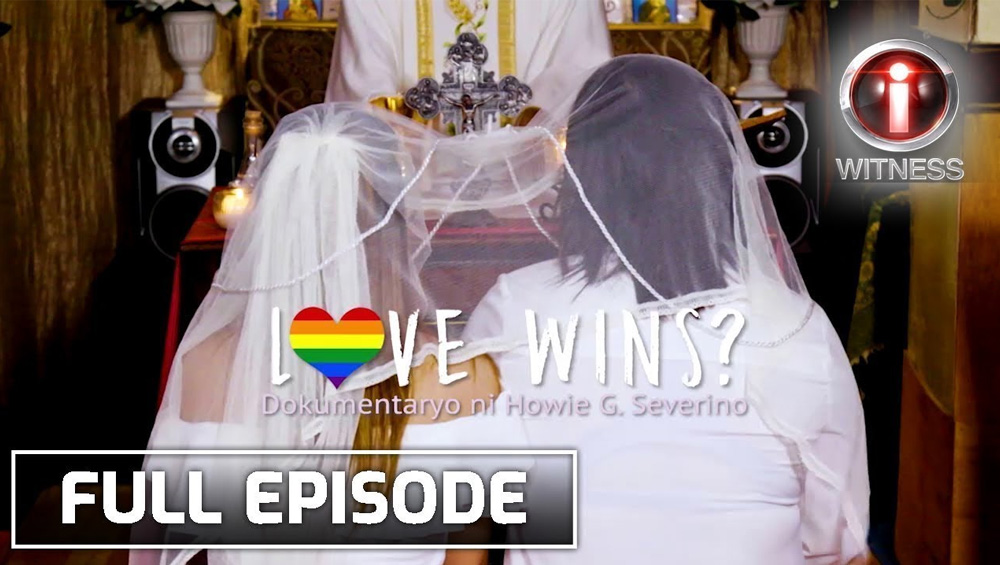Hearing that Jesus had silenced the Sadducees, the Pharisees got together. One of them, an expert in the law, tested him with this question: “Teacher, which is the greatest commandment in the Law?”
Jesus replied: “ ‘Love the Lord your God with all your heart and with all your soul and with all your mind.’ This is the first and greatest commandment. And the second is like it: ‘Love your neighbor as yourself.’ All the Law and the Prophets hang on these two commandments.”
Matthew 22:34-40
During my flight from Dubai to Manila, I was able to watch the documentary of the life of Mr. Fred Rogers, an icon in children’s television starting in the late 60’s. Just about the time MCC was founded. I was crying while watching it, and I must tell you, I am not someone who cries easily.
Fred, very early on in life was fascinated by what was new at the time, “Television” and he had a passion for children. There were already some shows for children but it was about clowns throwing pies at each other and hurting each other comically. Well, Mr. Rogers never found them funny but rather problematic. He believed that television can be used to teach children many simple yet ancient truths; that of kindness, care and love. He valued children’s thoughts and feelings and firmly believed that children’s emotions or feelings were as valid and as true as those of adults. This was revolutionary at the time and I guess, it is still revolutionary idea even today.
He was an ordained Presbyterian Minister but his pastoral ministry was not in a traditional church altar and pulpit. He did not wear a collar or robes. His altar was the studio with low-budget sets and props and his pulpit are the huge cameras of his time. The sermons he gave were a different kind and came out through various puppets. The hymns he composed were children songs that expressed deeply held human truths.
The Opening song of the children’s show ends with “Won’t you be my Neighbor?”
The question is still and even more needed to be asked today? “Would you be a neighbor?”
What does it mean to be “Kapit-Bahay” today? How can we be good neighbors to each other? How can be we be good neighbors to our family and friends? How can we be good neighbors to those who are different from us? How can we be good neighbors to those we consider as enemies? How can we be good neighbors to those who have offended us or hurt us? How can we be good neighbors to those we have offended or hurt? How can we be good neighbors to those who are suffering injustice and are in need? How can we be a good neighbor to ourselves?
Roger’s own childhood in the 1930s and 1940s was not an easy one. Though born in a life of privilege and wealth, he was born at a time where children were never allowed to expressed their emotions, especially emotions of sadness, anger and other negative emotions. They were to keep silent and to always be prim and proper. Fred as a child was bullied and I guess this is why slaps tick comedy of hitting each other and throwing pies at each other was something he did not like. He did not find it as an innocent form of comedy but rather speaks of the subtle ways that society is teaching children to express themselves and their emotions by degrading and dehumanizing others. He offered a different way.
The documentary of Roger’s life explored about his theology as a human being and as a Christian.
In the documentary, they said that Mr. Rogers deeply and profoundly believed that each child, and indeed each person is unique and special; that each person is deserving of love and is capable of loving. He believed, practiced and preached that “we are all God’s children created in God’s image and are truly and deeply loved.” This is the first and primary message that was evidently expressed in his children’s songs, stories and the program episodes he made. The message has always been simple.
You are unique. You are worthy. You are loved and worthy of love. Therefore, you are seen and heard even if you are just a child. Talking about this timeless message, it cannot be helped that this often gets contrasted against the world of the 60s, 70s, and onwards, where there is the Vietnam War, the Cold War and many other upheavals of the time. There was still inherent racism and segregation in the United States. The message of Mr. Rogers through a children’s program was profoundly simple yet powerful. It spoke not only to children but to families. Mr. Rogers would have episode that discussion responded to racial segregation and violence in a way that was truthful yet simple and easily understandable to children. At a time where white people did not want black folks swimming together with them in the same swimming pool or beach, Fred Rogers took upon himself to have an episode that addressed this issue. He had a black policeman character share with him a cold tub of water to cool their feet and he even washed and dried the black man’s feet. Mr. Rogers spoke politics and against politics of the time through a children’s program. He was not afraid and he was truly creative in doing so.
I cannot fully explain or expressed the spiritual wisdom and wealth found in that documentary. I am actually curious to watch some of the episodes if I can find one somewhere online. I would definitely watch the movie-biography that is played by Tom Hanks and I encourage you all to watch also.
I am sure, you might be asking why I am talking about someone that is completely oblivious or unknown to us in the Philippines, however, there is such great wisdom in his story and the work he did that perhaps can inspire you and me, and us as a community. I really hope you will look him up, his documentary and will also watch his biographical movie.
Mr. Fred Rogers seemed to me was one of those great and remarkable saints of our time; Simple yet remarkable human being. But even as over time he became famous for his children’s program and stared to also have a voice in many of the social and political issues of his time, it is not without any challenges and detractors. He was once asked in an interview pointblank if he was a ‘GAY’ because he did not fit the machismo demeanor of what men were supposed to be. Most of his career, the suspicion of him sexuality was always there despite having a loving wife and children. Not that there is anything wrong with being gay, but during the early times of his program in the 70s and 80s, the gay liberation movement was also on the rise with an equally rising antigay opposition. Therefore to be smeared and suspected of being gay himself, his message of tenderness, kindness and love would also be questionable – because men, real men, according to his time and context (and even ours) is to never show emotions. To be strong and formidable that often expressed itself with violence, machismo and misogyny.
Many criticized Mr. Roger’s because to them he proclaimed a message that they think made children and future adults as privileged; One person said, “He taught children that they are special and therefore deserved everything. They didn’t need to work hard enough. He told them they are special when they are not special.”
I understand the concerns of the detractors, and perhaps there is some little truth to them. After-all child psychologist says that the most egotistical period of a person’s life is in his childhood. But I don’t think this was the message of Mr. Rogers. Fred, as I see in the documentary, validated children’s experiences and feelings so that children may have greater awareness of their feelings and experiences and thereby teaching them very early on, a way to manage and handle emotions in healthy ways. By valuing the child through validating the child’s internal thoughts and feelings, Mr. Rogers makes the child accountable. To be a neighbor to others begins with an awareness of the self and the ways the self can be loving or hurtful. To be a neighbor means to think about the neighborhood, the community, the barangay, but this is only possible when we are able to see in ourselves our uniqueness and inherent value. For whatever is our internal realm is then reflected and projected towards the external world. To see ourselves as loved and worthy of love and held accountable in that same love is to project that same love to others. Mr. Roger was actually giving children an early training towards the hardest work in the world, to strive to see ourselves as lovable and through it struggle to love others. Yes, you heard it right – the hardest work to do in the world is to love ourselves with the intention of loving others.
In the documentary, one of his sons said, “it was hard when the second Christ was your Dad”. . I guess what his son is saying is that his father was indeed one of those unique individuals who truly embodied Christ and his gospel. Si kristo na nagkatawang tao kay Fred Rogers.
Mr. Roger’s life and ministry was the embodiment of a simple yet ever so urgent, ever so timeless message that awaits conception in each of us. The question in his song, “won’t you please, would you please, should you be my neighbor?” is an ever present question whose answer awaits its birth in each of us.
In the name of the Christ who was embodied in the life and work of Mr. Rogers. Amen.


